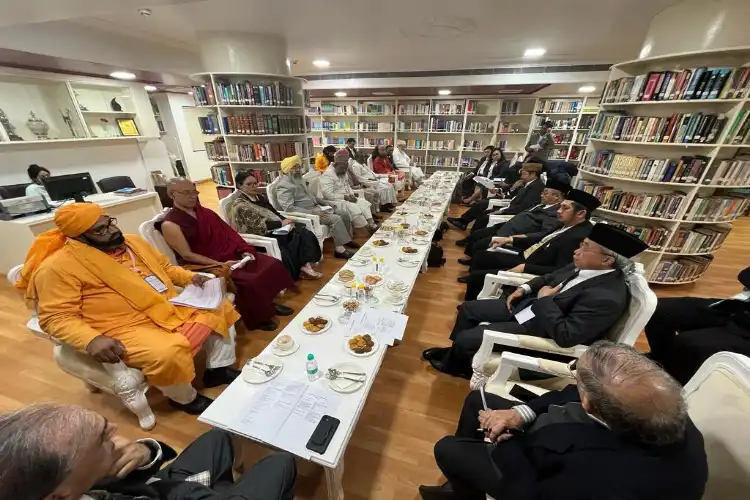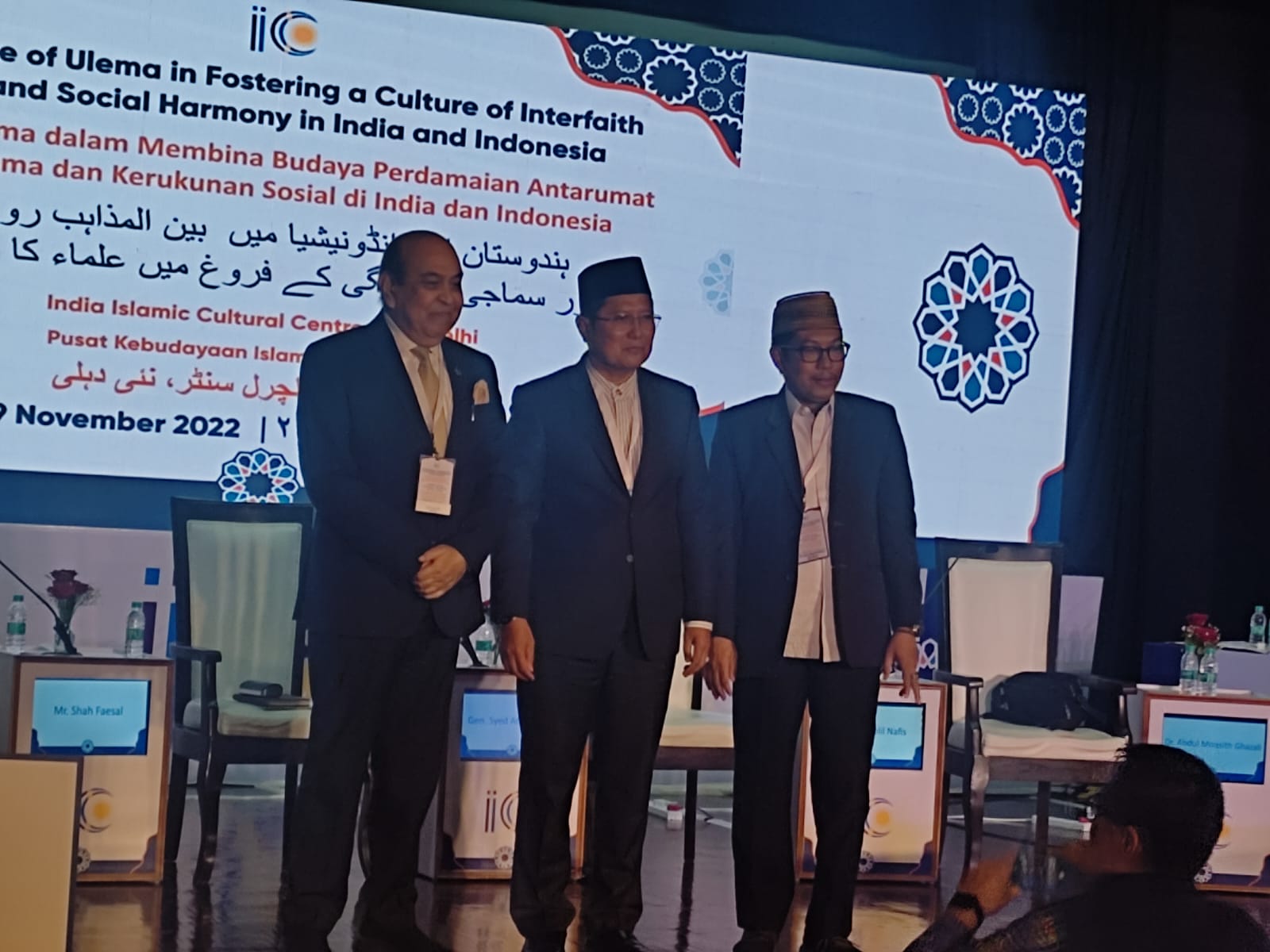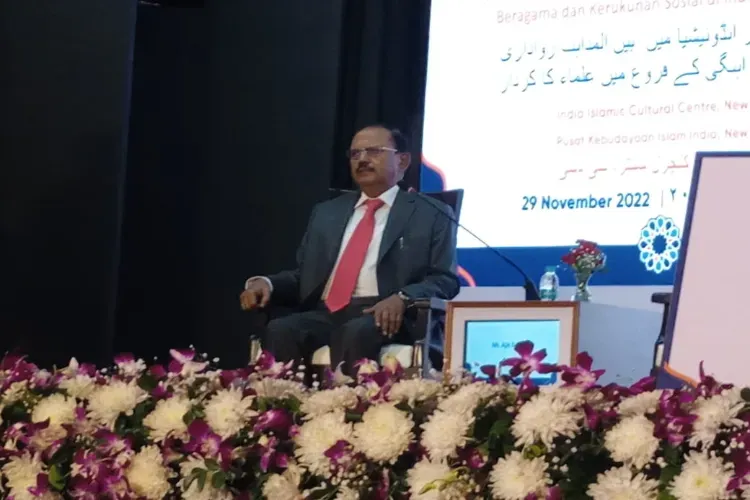
New Delhi
The day-long Conference – The role of Ulema in fostering a culture of interfaith peace and Social harmony in India and Indonesia – saw the Islamic scholar emerge as key players in tackling the rising trend of radicalization among the youth and promoting interfaith living.
The scholars from India and Indonesia exchanged notes and spoke of their respective experiences of dealing with the issues that confront secular and multicultural societies and countries, Both India and Indonesia are culturally rich and diverse countries and proudly flaunt their heritage.
However, both countries have to deal with modern issues like disinformation about religions being spread easily through social media and the hatred that tend to divide them.
The conference was organized by the India Islamic Cultural center. The Indonesian delegation led by a senior Minister with several portfolios Prof Dr. Mohammad Mahfud M.D was invited by India’s National security adviser Ajit Doval.
Speaking at the Conference Lt Gen (retired) Syed Ata Hasnain said he had met many terrorists in Kashmir who picked guns under the influence of propaganda and false information. He said the ulema had a key role in communicating to the youth the real meaning of the Quranic message which is for loving one country and being non-violent.
Shah Faesal, a senior bureaucrat said the problem arises when the Quranic verses are quoted out of the context.
The meeting discussed the historical and cultural context of Islam in both countries and Islam's teachings on peaceful co-existence and tolerance.
The Ulema shared views on the experience and practice of Islam in multi-religious societies like India and Indonesia. They appreciated the prevalence of religious freedom, pluralism, and equality before the law in both societies.
They spoke about contemporary challenges of religious radicalization and extremism, and the need to counter disinformation and propaganda.
Noting the key role of Ulema and other religious leaders as well as education in countering radicalization and extremism, the participants, the Ulema agreed to work together to develop common narratives on deradicalization.
Both sides were unanimous in pronouncing that a better understanding among different faiths is at the core of building a harmonious society.

Lt gen (retd) Syed Ata Hasnai with Indonesian Ulema
nThe participants denounced all hate speech, prejudice, propaganda, demonization, violence, and conflict and condemned the misuse of religions for these ends. The discussions emphasized the need to contribute all efforts possible toward building mutual understanding, trust, and respect to build secure, peaceful, and prosperous societies.
The Indonesian delegation also met with leaders of different religions from India. They emphasized the role of religious leaders in promoting inter-faith understanding toward building a harmonious society.
The participants agreed to increase engagement between themselves and the common people, especially scholars, academia and students by exploring cooperation between civil society organizations, think tanks, universities, and other social as well as educational institutions.
Interestingly, Indonesian ulema said that “Unity in diversity was enshrined in their system. They appreciated Doval’s interest in bringing the Ulemas of two countries together on a such serious issue as a “mark of good leadership.” for leading this initiative.

NSA Ajit Doval attending the Conference
Muslim intellectuals and scholars of India also highlighted in this conference the aspects of their country based on which it has been said 'Sare Jahan se achcha Hindustan Hamra' but emphasized that in the current situation religious tolerance should be worked on.
The scholars of Indonesia and India agreed on the common need to counter the contemporary challenges of religious fundamentalism and extremism; disinformation and propaganda that can prevent peaceful coexistence among followers of different faiths.
This consensus emerged that education could play a key role in combating fundamentalism and extremism; need to develop a common narrative to eliminate radicalization.
Scholars also discussed the experience and practices of Islam in India and Indonesia, both being secular and multi-religious States. ‘
Religious leaders agreed that better understanding among different faiths is a constructive element in efforts to build harmonious societies. The participants condemned all hate speech, bigotry, propaganda, demonization, violence, conflict, and misuse of religions for these purposes. The discussion emphasized the need to make every effort to build mutual understanding, trust and respect to build safe, peaceful, and prosperous societies.
The Indonesian delegation also met with leaders of various religions. He emphasized the role of religious leaders in promoting interfaith. The participants agreed to encourage further engagement between themselves and the larger communities of the two countries by exploring collaboration between civil society organizations, think tanks, universities, and other social and academic institutions.
